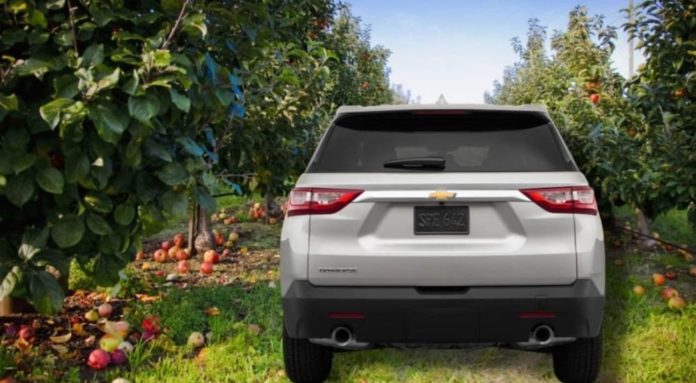A bag of perfectly good apples are now rotting in the backseat of an area couple’s 2022 Chevy Traverse after their annual trip to a local orchard. Witnesses say Tom Cole and his girlfriend spent hours finding the perfect produce to “match their aesthetic,” but reports now indicate that the chosen apples have a slim chance of ever seeing the inside of a kitchen.
“This isn’t the first time something like this has happened. Last year we were so focused on getting our apple picking selfies and capturing the perfect shot of steam rising off our mulled cider for Instagram that we didn’t realize until we got home that we hadn’t actually bought any apples,” says Cole.
The result of a long afternoon spent sitting in the bumper-to-bumper traffic; the apples now appear to have been more of an excuse to gain clout than a usable foodstuff. “To be honest, I haven’t had an apple in maybe three years. They’re not even keto, and the red really tends to wash out my eyes in photos,” says aspiring influencer Tiffany Cole.
In some respects, the Cole’s Traverse is the ideal vehicle for such a job. With a full-size third-row seat, the SUV has room for as many as seven or eight passengers, or what produce experts call a “shit ton” of apples. With an estimated average volume of 7.6 cubic inches per apple, the 2022 Traverse can easily accommodate over 20,000 individual units of fall’s favorite snack.
The Coles are not alone in their fruity forgetfulness. Orchard owners have caught on to the trend and now offer a tidy solution that fits well within the eco-conscious ethos of these weekend warriors: apple recycling. Upon leaving the orchard, visitors will pass a large bin where they can deposit unwanted apples before returning home. The orphaned fruits are then gathered up and carefully reattached to trees using fishing line, ready for the next finance bro in his one-day-old Carhartt jacket to “discover,” photograph with a $2,500 camera, and never upload to a computer.
“We realize that we’re not really so much an orchard anymore as we are what’s called an ‘experiential rural agricultural excursion,’” says Cleat Clemmens, owner of Clemmens Fruit Farm. “I can’t say I understand it, but their money’s green, so who the hell cares.” Clemmens says he will use the money saved through the apple return program to improve the orchard’s 5G coverage, as “I can’t get enough bars” has rapidly become the most common complaint amongst the social media-dependent clientele. “Once upon a time, it was enough to just provide quality apples, a quaint little hayride, and some ‘homemade’ fudge we bought from Costco, but things change quickly,” Clemmens says.
The 2.5-pound bag of apples, which cost the couple $17.50 at Clemmens Fruit Farm, are sold for $3.99 at the Cole’s neighborhood grocery store. When asked to justify the price discrepancy, the farmer shrugs. “They’re worth what people will pay for them, and this crowd has more dollars than sense if you know what I mean,” he says.
“It’s not just the apples either. The other day when I was flushing out the radiator on the tractor, I bottled up the antifreeze in some old mason jars and sold it as some of that ‘kam-bucha’ they’re so wild about. It was a joke at first, but now I’ve got several specialty grocers in the city asking to be our exclusive distributor,” Clemmens says.
Statistics show the apples will likely remain in the Cole’s backseat until mid-October when the couple journeys to pick out the perfect Halloween pumpkin. They will be disposed of at the nearest Starbucks, where the Coles will embrace the one autumnal rite of passage they truly care about: the Pumpkin Spice Latte.












